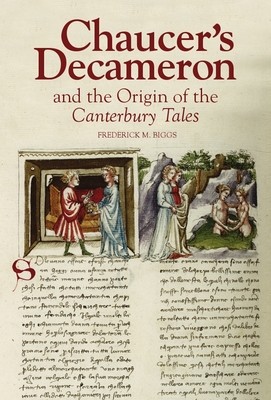
- We will send in 10–14 business days.
- Author: Frederick M Biggs
- Publisher: Boydell & Brewer
- Year: 2019
- Pages: 294
- ISBN-10: 1843845350
- ISBN-13: 9781843845355
- Format: 15.6 x 23.4 x 1.6 cm, minkšti viršeliai
- Language: English
- SAVE -10% with code: EXTRA
Chaucer's Decameron and the Origin of the Canterbury Tales (e-book) (used book) | bookbook.eu
Reviews
Description
A major and original contribution to the debate as to Chaucer's use and knowledge of Boccaccio, finding a new source for the "Shipman's Tale".
A possible direct link between the two greatest literary collections of the fourteenth century, Boccaccio's Decameron and Chaucer's Canterbury Tales, has long tantalized readers because these works share many stories, which are, moreover, placed in similar frames. And yet, although he identified many of his sources, Chaucer never mentioned Boccaccio; indeed when he retold the Decameron's final novella, his pilgrim, the Clerk, states that it was written by Petrarch. For these reasons, most scholars now believe that while Chaucer might have heard parts of the earlier collection when he was in Italy, he did not have it at hand as he wrote.This volumeaims to change our understanding of this question. It analyses the relationship between the "Shipman's Tale", originally written for the Wife of Bath, and Decameron 8.10, not seen before as a possible source. The book alsoargues that more important than the narratives that Chaucer borrowed is the literary technique that he learned from Boccaccio - to make tales from ideas. This technique, moreover, links the "Shipman's Tale" to the "Miller's Tale"and the new "Wife of Bath's Tale". Although at its core a hermeneutic argument, this book also delves into such important areas as alchemy, domestic space, economic history, folklore, Irish/English politics, manuscripts, and misogyny. FREDERICK M. BIGGS is Professor of English at the University of Connecticut.
EXTRA 10 % discount with code: EXTRA
The promotion ends in 21d.16:35:40
The discount code is valid when purchasing from 10 €. Discounts do not stack.
- Author: Frederick M Biggs
- Publisher: Boydell & Brewer
- Year: 2019
- Pages: 294
- ISBN-10: 1843845350
- ISBN-13: 9781843845355
- Format: 15.6 x 23.4 x 1.6 cm, minkšti viršeliai
- Language: English English
A major and original contribution to the debate as to Chaucer's use and knowledge of Boccaccio, finding a new source for the "Shipman's Tale".
A possible direct link between the two greatest literary collections of the fourteenth century, Boccaccio's Decameron and Chaucer's Canterbury Tales, has long tantalized readers because these works share many stories, which are, moreover, placed in similar frames. And yet, although he identified many of his sources, Chaucer never mentioned Boccaccio; indeed when he retold the Decameron's final novella, his pilgrim, the Clerk, states that it was written by Petrarch. For these reasons, most scholars now believe that while Chaucer might have heard parts of the earlier collection when he was in Italy, he did not have it at hand as he wrote.This volumeaims to change our understanding of this question. It analyses the relationship between the "Shipman's Tale", originally written for the Wife of Bath, and Decameron 8.10, not seen before as a possible source. The book alsoargues that more important than the narratives that Chaucer borrowed is the literary technique that he learned from Boccaccio - to make tales from ideas. This technique, moreover, links the "Shipman's Tale" to the "Miller's Tale"and the new "Wife of Bath's Tale". Although at its core a hermeneutic argument, this book also delves into such important areas as alchemy, domestic space, economic history, folklore, Irish/English politics, manuscripts, and misogyny. FREDERICK M. BIGGS is Professor of English at the University of Connecticut.


Reviews